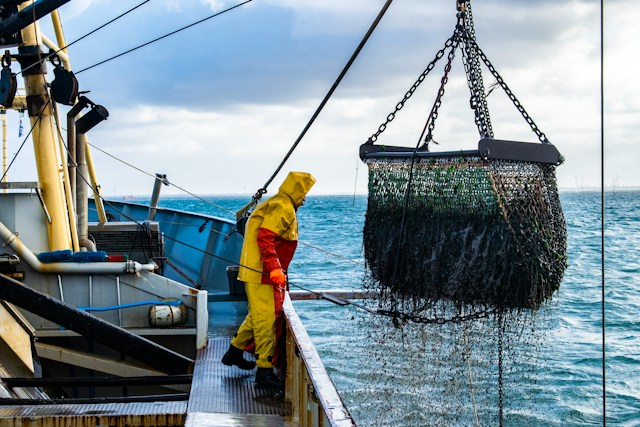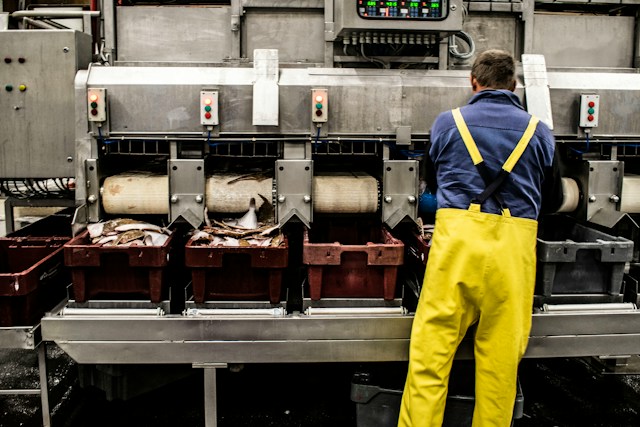
Friday is fish day. But in a world increasingly sensitised to questions regarding the environment and animal welfare, the fishing industry today is becoming the focus of ever-greater critical scrutiny. The reputation of the industry has traditionally been dogged by a wide range of issues, from overfishing through to problematic catch methods. But behind the public debate, which revolves primarily around using the seas in a sustainable way and protecting marine environments, there is another, hidden problem, which seems hardly to be taken into consideration: forced labour. In China in particular, one of the most important actors in the global fishing business, alarming reports have surfaced which highlight the fact that the shadows of modern exploitation also extend way out across the oceans.
WHAT ACTUALLY IS FORCED LABOUR?
According to the International Labour Organisation (ILO), forced or compulsory labour is defined as any form of labour or service that is demanded of a person subject to the threat of punishment, or for which that person has not voluntarily made themselves available. In this context, the term “threat of punishment” may refer to a range of different types of sanction, including imprisonment, the use or threat of physical violence, psychological pressure, and restricting the liberty of those employed. Threats against the families of the victims and the threat of being taken to the authorities also serve as powerful means of intimidation. Identity documents or pay are often withheld, forcing workers to keep working, merely in the hope of being paid in the future.
Forced labour is a worldwide problem which occurs both in the global south and north. Figures from the ILO for 2022 highlight the huge extent of the problem: in 2021, for example, it is estimated that 49.6 million people were engaged in modern slavery, 27.6 million of whom were in forced labour. The vast majority of cases of forced labour (86%) take place at private sector companies. Of the 27.6 million people in forced labour, 17.3 million were being exploited in the private sector, 6.3 million through forced sexual exploitation, and 3.9 million within systems of state-organised forced labour. The highest numbers of forced labourers are in Asia and the Pacific region (15.1 million), with migrant workers three times more at risk of becoming victims of forced labour than other workers.
THE DARK SIDE OF THE FISHING INDUSTRY
The largest fishing fleet in the world belongs to China. Every year, it catches around 2.2 tons of fish and seafood, which is sold around the world, and eventually also finds its way onto our local supermarket shelves. Until recently, relatively little was known about the conditions under which this fish was caught and processed. But a new report by the Environmental Justice Foundation (EJF), an environmental and human rights organisation, has shown the shocking scale of illegal fishing practices and serious human rights breaches by the Chinese high seas fleet.
ILLEGAL FISHING
Illegal fishing is widespread in the Chinese high seas fleet. Statements by over one hundred crew members of 88 ships which were collected by the EJF provide evidence of a range of different forms of illegal fishing. Almost all the crew members who were questioned referred to the illegal practice of removing shark fins on board the ships, a grisly method through which the animals’ fins, which are considered particularly valuable, are cut off, and the animals simply thrown overboard. Smartphone recordings acquired by the EJF also show how sea lions are bludgeoned to death and their heads cut off. Over one-third of those questioned reported that protected species such as turtles and seals were caught and killed on their ships. As well as this, around one-fifth of the crews said dolphins were routinely being slaughtered and used as bait for sharks.
HUMAN RIGHTS BREACHES
But it’s not just animals that suffer under this exploitative system, in which maximising profit and reducing costs are the highest priorities. According to the Environmental Justice Foundation, state subsidies of around 1.65 billion euros not only enable illegal fishing, but also lead to severe human rights breaches on board the ships involved.
Workers report physical and verbal mistreatment, having hardly any contact with the outside world, being forced to work extreme hours, getting little sleep and not being given sufficient food or water. The interviews and film material gathered by the EJF show, amongst other things, Indonesian crew members being beaten with metal pipes and threatened with knives by senior Chinese crew members. In total, more than half (58%) of those questioned said they had seen or personally experienced physical violence, and 85% reported abusive working and living conditions. Almost all the crew members questioned (97%) also said they had been affected by some form of bonded labour, or that important documents such as passports, had been taken away from them.
“I saw my crew mate got hit until he bled… He did not fight back, he could only cry upstairs”
EXPLOITATION ALSO RIFE IN FISHING FACTORIES
Before the fish comes to us in Europe, it has probably also spent time in a Chinese fishing factory, where it is packaged and subsequently prepared for consumption. Although workers enjoy “mass employment and social harmony”, according to the Chinese state, The Outlaw Ocean Project was able to gather evidence and indices showing that a majority of employees in Chinese fish factories originate from far-away Xinjiang, and that they are not working there voluntarily.
If recruiters knock on their door, workers have practically no choice but to comply. According to reports, at least a thousand Uyghurs have already been taken to Shandong, an important port on the east coast of China, to process fish in the factories. Criticism of these practices is censored by the Chinese government, according to the journalistic project. Many companies tend to employ workers from Xinjiang, and as a rule, access is usually prohibited for journalists. Workers from Xinjiang are strictly supervised, often accompanied by security staff, live in collective accommodation and eat in separate canteens. Anyone breaking the numerous rules is subjected to harsh punishment.

MSC SEAL OFFERS NO GUARANTEE
As part of “The Outlaw Ocean Project”, journalists examined several factories which would probably be processing fish for the European market as well. Incredibly, all the firms employing forced labourers from Xinjiang were certified by the Marine Stewardship Council (MSC). This is despite the fact that fisheries convicted of using forced labour are excluded from an MSC certification. The certification company Sedex, which checks sustainable supply chains, points out here that it can be difficult and risky for investigators to clearly identify such state-sanctioned forced labour.
If, as a consumer, you don’t want to support such practices, the option remains of falling back on domestic organic fish products. Alternatively, you could use it as a reason to avoid eating fish in general.
Translated by Tim Lywood
#Zwangsarbeit #ModerneSklaverei #Fischerei #Fischindustrie #AgainstHumanTrafficking #GegenMenschenhandel #EndExploitation #EndTrafficking #HopeForTheFuture #Österreich
